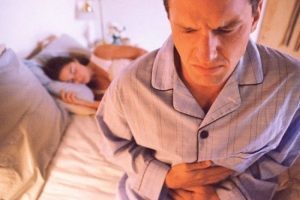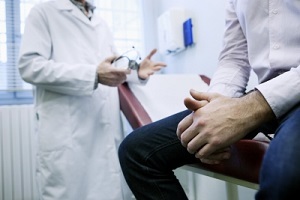
Prostatitis > is a disease that mainly affects men between the ages of twenty and fifty-five. The risk of prostatitis increases with age.
During primary prostatitis, glandular functions are activated. Along with the onset of inflammation, tissue regeneration occurs.
Let's take a closer look at the first signs and treatment of prostatitis in men.
How to recognize?
The onset of prostatitis is rarely recognized unequivocally, as it is sometimes asymptomatic and the symptoms are individual to each patient and change over time.
These features include:
- The man has some difficulty urinating in the toilet. The gland gradually grows, the urethra shrinks.
- The patient loses interest in sex. The difficulty of waking up the penis while trying to have sex increases. Orgasm is difficult to achieve or is weak or completely absent.
- Burning in the urethra, itching in the perineum.
- I want to urinate often, but it's dripping.
- Sperm comes out quickly with minimal pleasure during sex.
- General fatigue, depression, irritability, aggression, anxiety increase.
Men experience weakness and reduced ability to work.
Sound in my ears, sound in my head.
In the morning, a person feels suffocated, loses initiative in life.
At the same time, at night, sometimes for a long time, erections and painful ejaculations occur spontaneously, not related to sexual intercourse.
Observing these phenomena, the patient calms down, thinking that he is well, the problems, in his opinion, are related to the partner, the relationship. Depression aggravates the development of the disease.
The first signs of prostatitis in men
There is a certain difficulty for the doctor and the patient to associate these symptoms with prostate disease. This can be caused by the stress of a conflict in your personal life (especially if there are reasons).
Other symptoms are more likely to be associated with primary prostatitis:
- The patient feels pain in the groin, ovaries, perineum, back.
- Prostatitis, with frequent urination, especially at night, makes this process more and more painful, and the outcome of attempts to empty the bladder becomes less and less important.
- Mucus begins to flow from the urethra.
Symptoms of the first prostatitis grow slowly over a year, two or three years. Worst of all, they are a chain reaction: due to the increase in adverse events in the prostate gland, a man not only finds satisfaction in himself, but also can not satisfy his sexual partner.
Therefore, sexual intercourse is less frequent and causes stagnation of blood circulation in the pelvic region. This stagnation, in turn, is one of the causes of prostatitis.
It differs from chronic in the symptomatology of acute prostatitis.
Its features:
- The temperature sometimes rises to 38-39 degrees for no reason, with parenchymatous prostatitis - up to 40 ° C.
- Dysuria reaches the point where it is impossible to urinate.
- Perineal pain is especially severe.
- The patient suffers from chills, nausea before vomiting.
- I have difficulty defecating.
What to do?
In chronic inflammation, the pain is mild, occurs periodically in the perineum and decreases, is transmitted to the spine and pubis. Excessive sweating, especially in the perineum.
Sexual dysfunction is permanent. In the morning, the prostate is excreted instead of urine for prostatitis. The pain is more painful, spreads to the sacrum, suprapubic, rectum, penis.
The rate of development of sexual disorders depends on the degree of involvement of the seminal vesicles, seminal vesicles located near the prostate in the pathological process. In men, the intensity of the production of sex hormones decreases with a long course of the initial stage of prostatitis.
Young men often panic and are afraid of sex in such cases. Fear of "shame", inability to perform the necessary actions with a partner, leads to neurosis, which worsens sexual function.
Sexual dysfunction occurs when a man has an excess of female hormones in his body and a deficiency of male hormones. They may also be the result of a previously undiagnosed latent asymptomatic inflammation of the prostate. Their development sometimes leads to male infertility.
What to do if you find the first signs of prostatitis? When these symptoms occur, you should make an appointment with a urologist, who will refer the patient for tests, taking into account the results, and determine (or not) the disease, its type.
Determining the etiology of prostatitis: whether it is bacterial or not is also very important for the choice of treatment. For example, treatment of non-infectious prostatitis with antibiotics is not only useless, but also very harmful to the body.

First aid for prostatitis will be provided by a doctor. Aims to restore normal urination with prostatitis. To do this, it is necessary to urgently reduce the size of the prostate gland, which compresses the urethra and does not allow urine to come out.
Relaxation of the glandular muscles can be achieved, for example, by massaging the prostate.
Prostate massage is a procedure that requires special skills of a masseur.
Performance by an amateur is fraught with serious complications and irreversible damage to internal organs.
A course of rectal suppository antibiotics is prescribed for the treatment of bacterial prostatitis. It must be understood that harmful microorganisms cannot be destroyed by folk remedies, sports, physical procedures and diet.
These methods will help or be needed during remission.
At the same time, a combination of these for the treatment of bacterial prostatitis may be sufficient for a complete cure without "chemistry", ie pharmacy drugs. It all depends on the stage of the disease, the individual characteristics of the patient's body, the doctor's experience.
If the disease has left the exacerbation stage, there is no more infection, the patient needs to be treated as soon as possible:
- start a regular sex life as soon as possible;
- Eliminate bad habits. Eat a diet for prostatitis patients;
- Get more exercise, do sports. Do special exercises for men.
What other diseases have these symptoms?
The symptoms described do not necessarily indicate prostatitis. They are accompanied by kidney disease, urinary tract infections, venereal diseases and other diseases.
Urethritis is the most common male disease. This is an infection caused by bacteria, viruses and fungi in the urinary tract. They are mainly sexually transmitted.
Sometimes the infection waits for a favorable hour in the body and manifests itself when the immune system is weakened. The reasons for its decrease are the same as those that cause non-bacterial prostatitis: hypothermia, bad habits, chaotic sexual behavior, abuse of acidic, spicy, salty foods, stress, physical activity.
What exactly is inflamed: the prostate or urethra (or both), will be shown by tests, ultrasound. The doctor will make a diagnosis based on.
Now you know about the first symptoms of prostatitis in men and its treatment. As with any disease, the sooner prostatitis is detected, the sooner you will cure it.
Ignoring prostatitis and the first signs of treatment brings non-serious patients to the operating table. It is better to act on time.
























